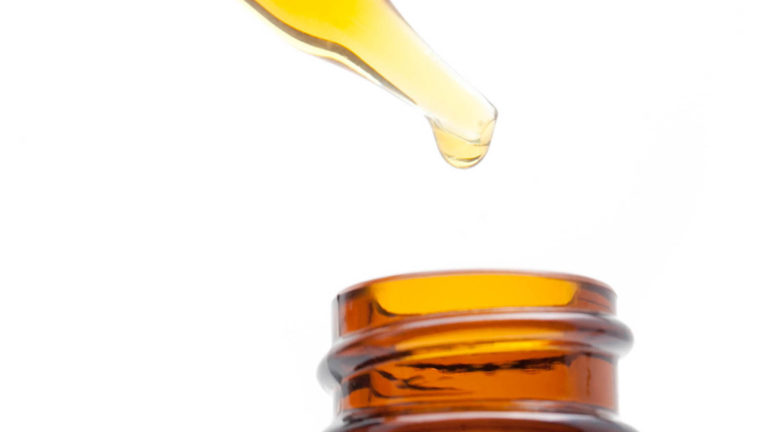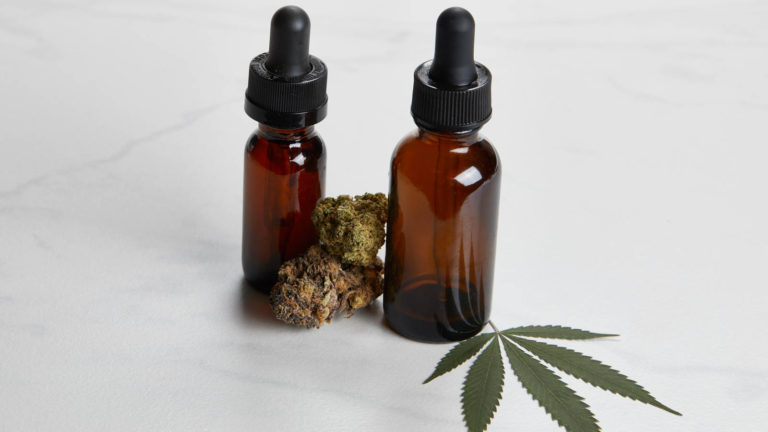Hemp-derived cannabidiol (CBD) oil is available in Montana but is prohibited in food, beverages, and dietary supplements. Hemp-derived CBD can legally be used in tinctures, oils, salves, balms, and lotions, which can be purchased from stores across the state.
CBD derived from cannabis is only available to those registered in the state's medical marijuana program. Montana legalized medical marijuana in 2004, under the Montana Medical Marijuana Act. Cannabis is illegal in Montana for adult use.
What is CBD?
CBD is a non-intoxicating cannabinoid found in cannabis. After tetrahydrocannabinol (THC), cannabidiol (CBD) is the second-most abundant cannabinoid in the plant, and has many potential therapeutic benefits, including anti-inflammatory, analgesic, anti-anxiety and seizure-suppressant properties. CBD can be sourced from both marijuana plants and hemp plants, which are legal in most countries as they contain minuscule amounts of THC.
 Photo by: Gina Coleman/Weedmaps
Photo by: Gina Coleman/WeedmapsImage lightbox

Combine THC and CBD to fully employ the entourage effect; THC and CBD work hand-in-hand to amplify each others' effects.
Why is CBD sometimes illegal?
All types of cannabis, including hemp strains that don't produce enough THC to cause intoxication, were considered illegal under the Federal Controlled Substances Act of 1970. The law categorized all cannabis as Schedule I, which defined the plant as a highly addictive substance with a high potential for abuse and no accepted medical use.
The Hemp Farming Act of 2018 re-classified industrial hemp as an agricultural commodity and made its cultivation federally legal. Further, the act removed some forms of cannabis from Schedule I status by creating a legal distinction between hemp and marijuana. Hemp is cannabis with less than .3% THC, and marijuana refers to cannabis with more than .3% THC. This distinction in federal law effectively legalized CBD that is derived from cannabis with less than .3% THC, as long as it has been cultivated according to federal and state regulations.
 Photo by: Gina Coleman/Weedmaps
Photo by: Gina Coleman/WeedmapsImage lightbox

The 2018 Hemp Farming Bill legislation does not mean that CBD derived from hemp is universally legal throughout the United States. According to the Farm Bill, the Food and Drug Administration (FDA) has the power to regulate CBD product labeling, including therapeutic claims and the use of CBD as a food additive. The FDA already maintained that hemp-derived CBD may not legally be added to food and beverages, or marketed as a dietary supplement.CBD does not meet the legal definition of an ingredient allowed in conventional food or dietary supplements because CBD extracts are already federally regulated as a prescription drug and pharmaceutical ingredient.
Although the organization has begun to re-evaluate its position on CBD products, the FDA has not revised its regulations. The agency also has been strict in its position against any labeling that could be perceived as a medical claim about CBD.
In addition to federal regulation of CBD, the Hemp Farming Bill of 2018 also gave states the option to regulate and prohibit the cultivation and commerce of CBD. States may also regulate CBD in food, beverages, dietary supplements, and cosmetic products independently, even before the FDA finalizes its policies.
Montana CBD laws
Hemp is legal in Montana. In May 2019, Senate Bill 176 was signed into law, allowing the Department of Agriculture to develop a state hemp program.
The Montana Hemp Plan is a reflection of this law. According to the plan, hemp must contain less than .3% THC (tetrahydrocannabinol) on a dry weight basis. There is no specific legislation outlining the state's position on CBD, however, several statements from the Montana Department of Agriculture and the Montana Department of Public Health and Human Services provide some guidelines.
The Montana Department of Public Health and Human Services (DPHHS) released a public letter in July 2019, declaring that CBD is prohibited from use as a food additive or dietary supplement. This stance was informed by the FDA position that hemp-derived CBD does not meet the legal definition of a food or dietary supplement.
The Montana Department of Agriculture does not regulate the production or sale of CBD oil in Montana but defers to the FDA for guidelines regarding CBD.
According to the DPHHS, CBD extracts and edibles containing more than .3% THC are best administered by the Montana Medical Marijuana Program, although consumers are entitled to make their own choices about using edible CBD products and extracts derived from marijuana. CBD sourced from cannabis is only legal for registered medical marijuana patients.
Licensing requirements for CBD
The Montana Hemp Plan legalized the commercial cultivation, harvest, possession, processing, sale, and purchase of industrial hemp in Montana. The Montana Department of Agriculture oversees all cultivation and production activities in the state and issues licenses to hemp growers and producers. Senate Bill 177, enacted in May 2019, eliminated the criminal background check required to grow hemp in the state.
An industrial hemp license is required to cultivate and process hemp in Montana. The fee for a state hemp license is $50, and the fee to participate in the state pilot program is $400. Licensees must provide documented evidence to the Department of Agriculture that the hemp they cultivate does not contain more than .3% THC.
Montana CBD possession limits
There are currently no limits on how much hemp-derived CBD a person can purchase or possess in Montana.
Medical marijuana patients are allowed to possess up to an ounce of medical marijuana at any one time.
While there are no explicitly stated penalties for those who are found in unlawful possession of cannabis-derived CBD, there are penalties stated for those found with cannabis.
Those found with 60 grams or less of cannabis, for whom it is their first offense, may be charged with a misdemeanor, imprisoned for up to six months and fined a maximum of $500. Individuals found with 60 grams or less of cannabis, for whom it is their second offense, may be charged with a misdemeanor, imprisoned for up to 3 years, and fined a maximum of $1,000. Those found in possession of more than 60 grams of cannabis may be charged with felony, imprisoned for up to 5 years, and fined $50,000.
Where to buy CBD in Montana
The Montana hemp-derived CBD market is relatively unregulated at present. You can buy CBD products at convenience stores, health food stores, and a large number of CBD-specific retailers. CBD derived from marijuana is only available for purchase from a state-licensed dispensary.
 Photo by: Gina Coleman/Weedmaps
Photo by: Gina Coleman/WeedmapsImage lightbox

When it comes to online sales, CBD is frequently found on brand-specific websites. Consumers can buy from a wide variety of online outlets for CBD products, read consumer reviews, and ship purchases to their homes.
Online shopping also offers the ability to gather detailed information about each product, compare different products and product types, and compare products in the market for the best price. CBD brands often also have their own ecommerce shop, allowing you to purchase your desired CBD products straight from the source. Find out more about where to purchase CBD.
How to read CBD labels and packaging
The 2018 Hemp Farming Bill shifted the oversight of hemp and hemp-derived products from the US Department of Justice (DOJ) to the US Food and Drug Administration (FDA). The FDA currently does not presently allow CBD-infused food, drinks, or dietary supplements to be sold, and hasn't yet provided regulations for hemp-derived CBD products.
Still, the agency warns that regulations in flux still require companies to make legitimate claims on their labels. Buyers should nonetheless approach CBD products with caution. Most reputable CBD producers typically include the following information on their CBD product labels:
- Amount of active CBD per serving.
- Supplement Fact panel, including other ingredients.
- Net weight.
- Manufacturer or distributor name.
- Suggested use.
- Full-spectrum, broad-spectrum, or isolate.
- Batch or date code.
One of the most important things to pay attention to is whether a CBD product is full-spectrum, broad-spectrum, or isolate.
Full-spectrum means that the CBD has been extracted from a hemp plant along with all other cannabinoids and terpenes, including whatever trace amounts of THC the plant may have produced. Consuming full-spectrum CBD may yield better results thanks to the entourage effect, a phenomenon in which the mixture of cannabinoids and terpenes work together to produce a more pleasant experience.
Broad-spectrum means that the product contains CBD and terpenes, but has undergone additional processes to strip out any THC.

